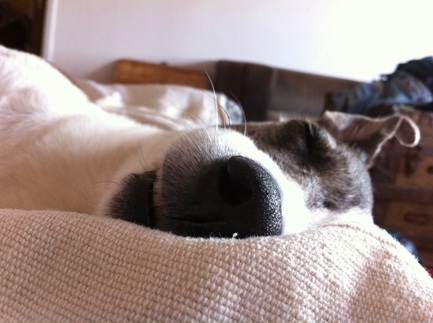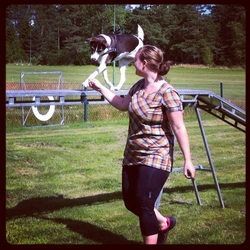I know it sounds strange.
Isn't passivity the thing where you do nothing? Yes, it is. Passivity - the trait of remaining inactive.
When I talk about passivity, I am talking about the activity in which we choose to do nothing with our dogs. Not all dogs needs this kind of training, but it's very common that most of dogs needs to exercise passivity in some shape or form. The need and execution of it varies but the goal is always the same - to teach the dog to relax, often at a given moment. For example, at work we work with the dogs to make them realize that during lunch, there will be no activity. That is the moment for them to wind down and maybe have a nap; trust me, it's not always as easy as it sounds.
We've all met the dogs who can though, those who just contently tumbles into the couch after a walk, or just l curls up by your feet during lunch. I love those dogs! We have those kinds of dogs at work and sometimes they are a great influence to some of our other dogs, who has a lot harder time to relax.
Isn't passivity the thing where you do nothing? Yes, it is. Passivity - the trait of remaining inactive.
When I talk about passivity, I am talking about the activity in which we choose to do nothing with our dogs. Not all dogs needs this kind of training, but it's very common that most of dogs needs to exercise passivity in some shape or form. The need and execution of it varies but the goal is always the same - to teach the dog to relax, often at a given moment. For example, at work we work with the dogs to make them realize that during lunch, there will be no activity. That is the moment for them to wind down and maybe have a nap; trust me, it's not always as easy as it sounds.
We've all met the dogs who can though, those who just contently tumbles into the couch after a walk, or just l curls up by your feet during lunch. I love those dogs! We have those kinds of dogs at work and sometimes they are a great influence to some of our other dogs, who has a lot harder time to relax.
I'm going to try and illustrate it with an example from work.
We have chosen at our work to keep the dogs together in rooms. We keep small and big dogs separated and in one of our big dog rooms, we have three flat coated retrievers. Lovely breed, energetic and seemingly insatiable when it comes to activities. We started to notice that particularly one of these ladies was very unhappy being in her room. She barked, howled and wined. For a start, we all agreed on that we were probably not giving her enough activities throughout the day. So for a while we focused on giving all three of them a little extra, to help them wind down and actually be tired at lunch. Sometimes it worked, sometimes not. We tried something new. Still activating them, we were very strict and clear about lunch for them, or so we thought! We told them to lay down, always in the same spots, in hope that this would give a sense of comfort to have the same place but nope, this didn't work entirely either.
Without knowing it, we had not exercises our wished passivity, but created an activity where the dog got a response for a behavior, almost every time, by us getting up from our chairs and telling them to lay down. In this particular case, we achieved our goal by ignoring the dogs and only giving feedback to them when they laid down and were quiet. The reward for the dogs were pebbles of treats and/or coming out to be with us during lunch (not walking around or playing, but laying down close to us).
By activating our dogs 24/7, be in consciously or subconsciously, we are closing in on the risk of overstimulating them and through that creating a mountain of stress. We way to easily teach our dogs to expect activity at every given time or place, but how nice wouldn't it be to say Yes, let's do something! instead of having to tell the dog that No, not happening. Nope, not now either. So, is passivity a dog sleeping in their bed exercising passivity? Could be, but not necessarily. Passivity is often in tight connection with environment training, as we would like for our dog to remain relaxed even in a new environment. If we can help our dogs to understand when we want to them to relax, I believe we'll get a more balance dog. It's a humongous stress for a dog to at all times expect that something is going to happen and I'm certain frustration rooted in all this expectation won't help either.
Your dog is an individual and with a personality that deserves to be respected and taken seriously, meaning everyone of them is different. You have to find what fits your dog and go on from there.
We have chosen at our work to keep the dogs together in rooms. We keep small and big dogs separated and in one of our big dog rooms, we have three flat coated retrievers. Lovely breed, energetic and seemingly insatiable when it comes to activities. We started to notice that particularly one of these ladies was very unhappy being in her room. She barked, howled and wined. For a start, we all agreed on that we were probably not giving her enough activities throughout the day. So for a while we focused on giving all three of them a little extra, to help them wind down and actually be tired at lunch. Sometimes it worked, sometimes not. We tried something new. Still activating them, we were very strict and clear about lunch for them, or so we thought! We told them to lay down, always in the same spots, in hope that this would give a sense of comfort to have the same place but nope, this didn't work entirely either.
Without knowing it, we had not exercises our wished passivity, but created an activity where the dog got a response for a behavior, almost every time, by us getting up from our chairs and telling them to lay down. In this particular case, we achieved our goal by ignoring the dogs and only giving feedback to them when they laid down and were quiet. The reward for the dogs were pebbles of treats and/or coming out to be with us during lunch (not walking around or playing, but laying down close to us).
By activating our dogs 24/7, be in consciously or subconsciously, we are closing in on the risk of overstimulating them and through that creating a mountain of stress. We way to easily teach our dogs to expect activity at every given time or place, but how nice wouldn't it be to say Yes, let's do something! instead of having to tell the dog that No, not happening. Nope, not now either. So, is passivity a dog sleeping in their bed exercising passivity? Could be, but not necessarily. Passivity is often in tight connection with environment training, as we would like for our dog to remain relaxed even in a new environment. If we can help our dogs to understand when we want to them to relax, I believe we'll get a more balance dog. It's a humongous stress for a dog to at all times expect that something is going to happen and I'm certain frustration rooted in all this expectation won't help either.
Your dog is an individual and with a personality that deserves to be respected and taken seriously, meaning everyone of them is different. You have to find what fits your dog and go on from there.


 RSS Feed
RSS Feed